I did Dr. Jordan Peterson’s online personality assessment. It’s easy and you can do it, too!
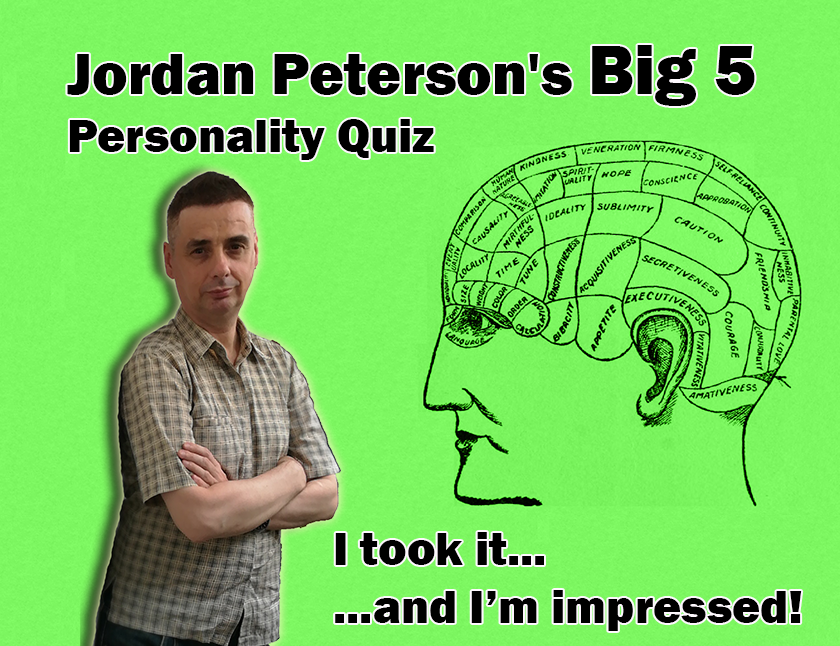
I thought I’d have a go at taking Jordan Peterson’s online personality assessment and this is my review and what I discovered…
But first, for those of you haven’t already heard of him, let me explain a little about Jordan Peterson.
Jordan Peterson is a rather controversial clinical psychologist and Professor of Psychology at the University of Toronto and he came to the public’s attention last year with his objection to the Canadian government's Bill C-16. The bill proposed to add "gender identity or expression" as a prohibited ground of discrimination and to similarly expand the definitions of promoting genocide and publicly inciting hatred in the Criminal Code. As a result of his objection, this mild mannered professor was suddenly catapulted into becoming a YouTube sensation and as of writing his YouTube channel has already gained 539K subscribers. That’s no mean feat in just one year, even though he has been posting videos of his lectures since 2014.
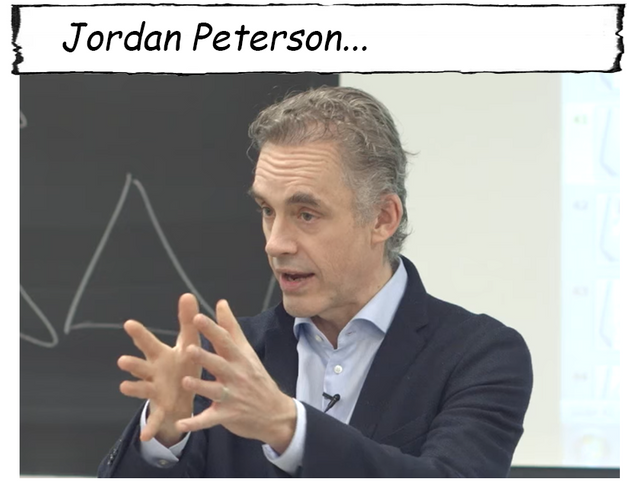
His channel is definitely worth a visit because many of these lectures are extremely illuminating and, I believe, Jordan Peterson has to be one of the most intelligent thinkers of our current times. With that in mind, I was intrigued by a video he posted in October entitled ‘20 Minutes on UnderstandMyself.com’ in which he announced his new online personality assessment. The video is below.
The assessment was based on a personality model developed ten years earlier by Jordan Peterson and a student of his at the time, Dr. Colin DeYoung. The model measures the ‘Five Big Aspects’ of personality and then breaks them down into their two statistically robust sub-components, which are as follows:
1. Agreeableness: Compassion (the tendency to emphatically experience the emotion of others) and Politeness (the proclivity to abide by interpersonal norms)
2. Conscientiousness: Industriousness (the ability to engage in sustained, goal-directed effort) and Orderliness (the tendency to schedule, organize and systematize)
3. Extraversion: Enthusiasm (spontaneous joy and engagement) and Assertiveness (social dominance, often verbal in nature)
4. Neuroticism: Withdrawal (the tendency to avoid in the face of uncertainty) and Volatility (the tendency to become irritable and upset when things go wrong)
5. Openness to Experience: Openness (creativity and aesthetic sensitivity) and Intellect (interest in abstract concepts and ideas)
This model has become quite popular in the area of psychology and the science paper which first announced it has gone on to accrued 150 citations, which is a lot for a scientific paper, and especially one which has only been around for 10 years. This has resulted in the paper becoming something of a classic.
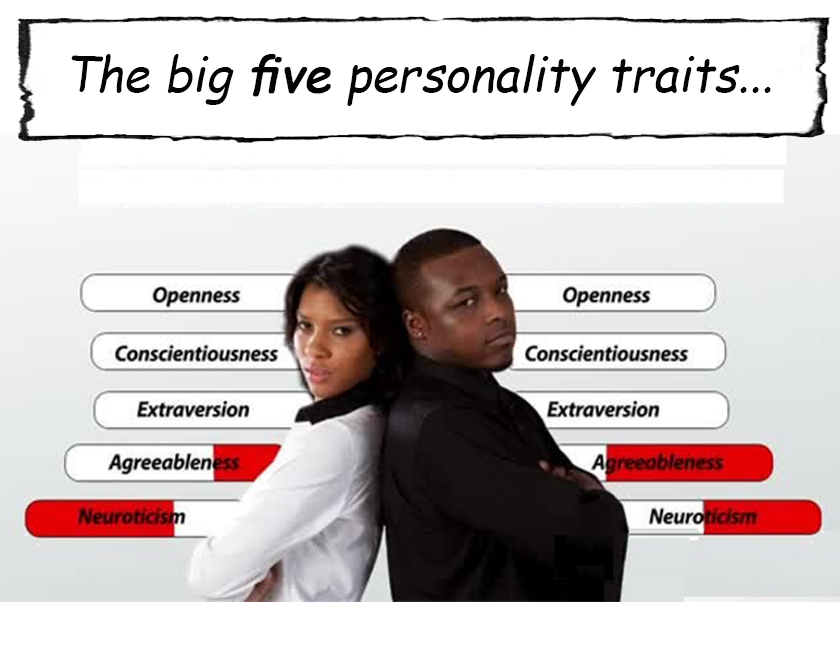
What is special about this personality model is that Jordan Peterson and his team was able to produce the most comprehensive and accurate personality report that is currently available. This was done by generating very detailed reports on each of the five traits and their accompanying ten aspects. These were then broken down into seven different levels of specificity ranging from extremely low to extremely high.
So, why should you want to do this test?
Jordan Peterson hopes that by doing this test people would have a much deeper understanding of their personality, and especially so in comparison to others. The following quote from the Introduction on their website explains it further:
The specialized, personalized report you will receive after completing the understandmyself.com process will help you understand your personality in great detail, and aid you substantially in your understanding of others. It will help you determine what jobs suit you and why, what sort of people you are likely to find compatible (and incompatible), where your strengths and weaknesses lie and, perhaps most importantly, just how profound the differences between individuals actually are. It isn’t only that we differ in our opinions. We differ in how we perceive the world, how we filter our facts, and how we arrange our goals and actions.
(www.understandmyself.com)
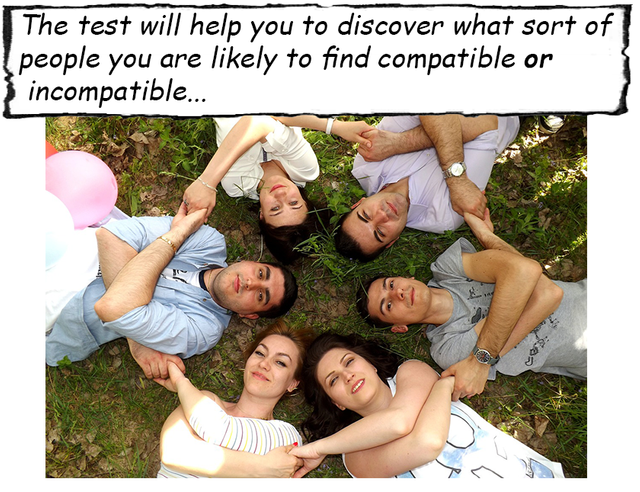
As Jordan Peterson further elaborates in his YouTube video, the test wasn’t designed to make you feel good about yourself, but to give you the most accurate and straightforward description of who you are and, if needs be, to be able to organize your life accordingly.
It’s also important to understand the difference between yourself and other people because we often believe that the reason we don’t share the same viewpoint is because we have differences of opinion. In fact, the reality goes much deeper because our perceptions are dependent on how we actually perceive the world around us, which at times can be very different to each other. By doing this, our personalities act as a type of filter through which we organize our perceptions, so it’s important to understand that there is substantial personality variability in the world we live in and you will often be talking to people who see things completely differently. To me, this sounds similar to what Timothy Leary called a Reality Tunnel, and which Robert Anton Wilson later elaborated on; whereby, with a subconscious set of mental filters formed from his or her beliefs and experiences, every individual interprets the same world differently, hence "Truth is in the eye of the beholder”.
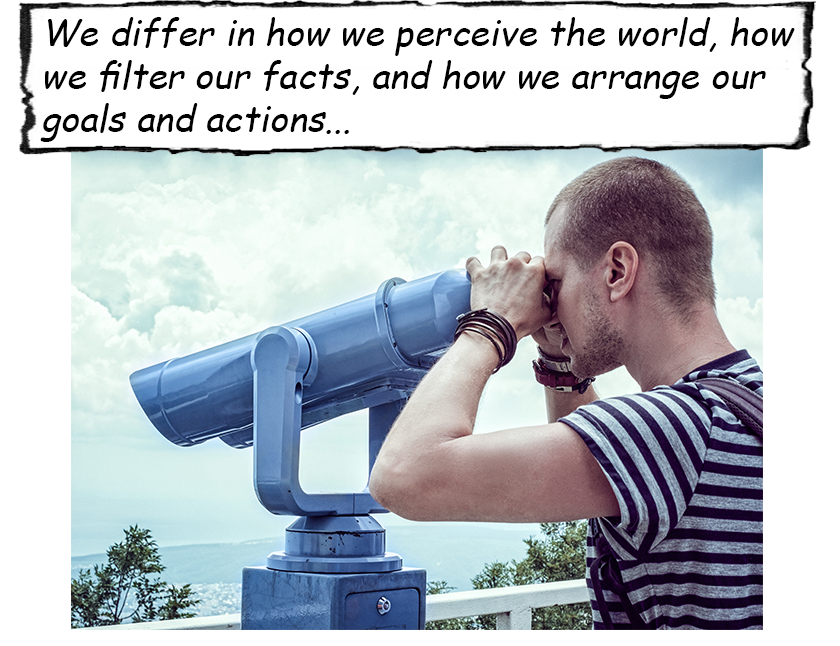
To illustrate this further, Jordan Peterson gives the example of when comparing the divide between left leaning and right leaning people because left leaning people tend to be very high in openness to experience and relatively low in conscientiousness. This is especially in its aspect of orderliness. On the other hand, conservative leaning people tend to be very high in conscientiousness and especially in orderliness, but relatively low in openness. The more conservative types are therefore more concerned with the preservation of traditions; whereas, those who are more to the left perceive the environment as constantly shifting and they feel the need to shift with it. As Jordan Peterson stresses, these viewpoints are both valid.
So what happens if you take the test and there’s something in your behavior you were unhappy about?
To deal with this, Jordon Peterson has created another website called The Self Authoring Suite in which he has developed a set of interventions whereby you can reconfigure certain elements of your behavior and, perhaps over the long run, even your personality. By doing this, he hopes that you can make your life better in a way which is much more beneficial to you; helpful to your family and also has a positive effect on the broader society around you.
To give weight to this, Jordon Peterson talks about some research he did in three different locations with several thousand university students and found that it helped them to stay enrolled in their education program by about 25%, which is a huge improvement, and on top of that, it also helped them to achieve better grades.
The Self Authoring Suite does sound like an excellent way for self-improvement, whether you’re a student or not.
You wouldn’t believe how easy it was to do the online personality assessment…
On visiting the Understand Myself website you are first given a brief explanation of The Big Five Aspects Scale and what you will be presented with when doing the assessment. You are also given some background information on the assessment itself and how it was developed.
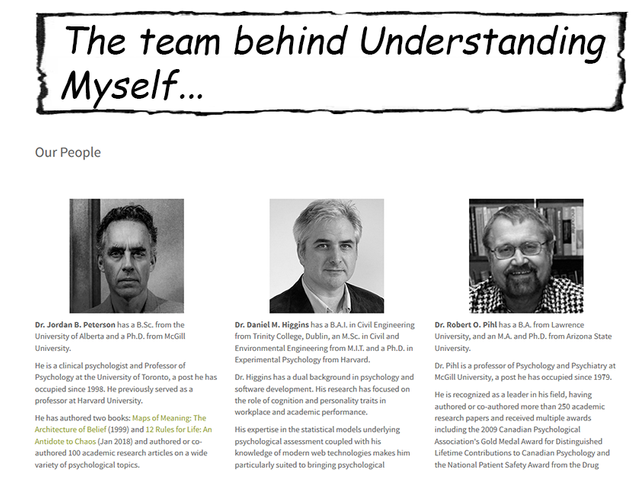
Then from a dropdown menu you have the opportunity to purchase the assessment at the very reasonable price of only $9.95.
You are also given another option to buy it for a friend in the form of a voucher and here you have a choice of a single voucher or bundles of either 5, 10 or 20.
On completion of the payment by either PayPal or your card, you are then asked to register with the site. On completion of that you are then ready to take the assessment.
Now, before jumping into doing the assessment, you must first ensure you’re doing it under the right conditions. This is extremely important because you won’t be given a second chance to do it again. You must adhere to the following:
• Don’t do it when you’re hungry
• Don’t do it when you’re tired
• Don’t do it when you’re feeling down or in a bad mood about yourself or feeling self-critical
• Don’t do it when you’re likely to be interrupted or distracted.
• You must think carefully about your answers
• Answer as you are typically and NOT as you would like to be
• Don’t be too hard on yourself or too good on yourself
• The more accurate you are, the more you will benefit from the feedback
If you are comfortable with all of the above, then you can proceed…
You will then be given a total of 100 questions with ten on each page. Each question is posed as a phrase and you answer each by choosing either ‘strongly disagree’, ‘disagree’, ‘neither disagree or agree’, ‘agree’ and ‘strongly agree’ or wording to that effect.
The questions themselves were derived from the International Personality Item Pool, which was created by Lewis R. Goldberg, P.H.D., and these questions are the result of many decades of work to define a set of phrases which most comprehensively and most concisely capture the variation in human personality and are not unique to the assessment itself – it’s how the assessment formulates the results which is unique.
It is said that the test can be completed within 15 minutes, but I would advise giving it a little longer if you want to be sure of answering it as accurately as possible. If you do make a mistake with one of your answers, you do have the option to go back and correct it, but this is only while you’re doing the test, and not afterwards, so be careful.
Once you’ve completed the test you instantly have access to your report – and it’s big!
The report can only be viewed on their website, although I think having an option to download it would have been nice, but that’s only a minor quibble.
My first result was Agreeableness and I was rated as ‘Typical’. My level of agreeableness was explained in terms of percentile as follows:
Your score puts you at the 50th percentile for agreeableness. If you were one of 100 people in a room, you would be more agreeable than 50 of them and less agreeable than 49 of them.
The results for your percentile for each of the major traits and their aspects are reported in the same manner throughout the report.
The report then went on to explain in 700+ words the characteristics of people with average levels of agreeableness. I won’t list them here, or for the other traits and aspects, because there are too many and it goes quite in depth.
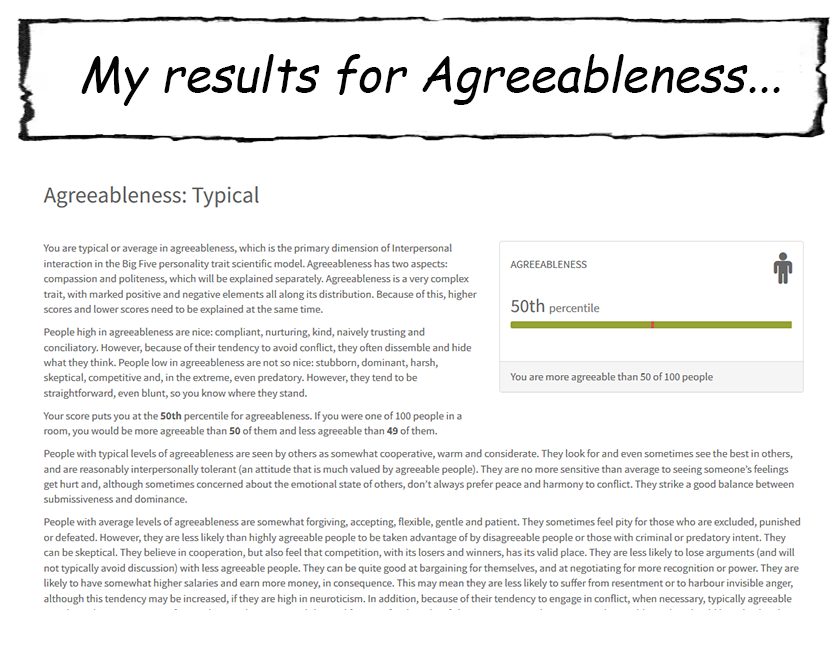
Agreeableness has two aspects: Compassion and Politeness, and so these followed next.
My Compassion was moderately high with a 66th percentile, but my Politeness was moderately low at the 32nd percentile.
Then next was Conscientiousness, which was rated as exceptionally high at the 96th percentile. This was followed by its two aspects, which were Industriousness and Orderliness. My Industriousness was very high at the 95th percentile and so was my Orderliness at the 90th percentile.
The next of the Big Five personality traits was Extraversion, which is a measure of general sensitivity to positive emotions such as hope, joy, anticipation and approach, particularly in social situations. Mine was rated as Typical or Average with a score at the 57th percentile.
The two aspects of Extraversion are Enthusiasm and Assertiveness and both of these were rated as Typical or Average. I had a score that put me at the 59th percentile for Enthusiasm and 52th for Assertiveness.
My Neuroticism was low at the 14th percentile, which as far as I can see, is a good thing because people with low levels of neuroticism rarely focus on the negative elements, anxieties and uncertainties of the past, present and future.
The two aspects of Neuroticism are Withdrawal and Volatility and my Withdrawal was rated as Moderately Low (27th percentile) and my Volatility as Very Low (9th percentile).
My Openness to Experience was Very High (89th percentile) and its aspects of Intellect and Openness were both rated as High (82nd and 87th percentile). The report stresses that Intellect shouldn’t be confused with IQ and it goes on to say that Intellect is a measure of interest in abstract ideas, essentially, while IQ is a measure of processing speed, verbal ability, working memory, and problem solving capacity, and is better measured with a formal IQ test. It is perfectly possible to have a high IQ and a low score on the personality trait of Intellect (or the reverse).
Finally, the last result was for Openness, which was rated as High (87th percentile). The report was again careful to avoid any confusion with the reader by pointing out that the closest synonym for openness (rather than openness to experience, which encompasses openness and intellect) was creativity.
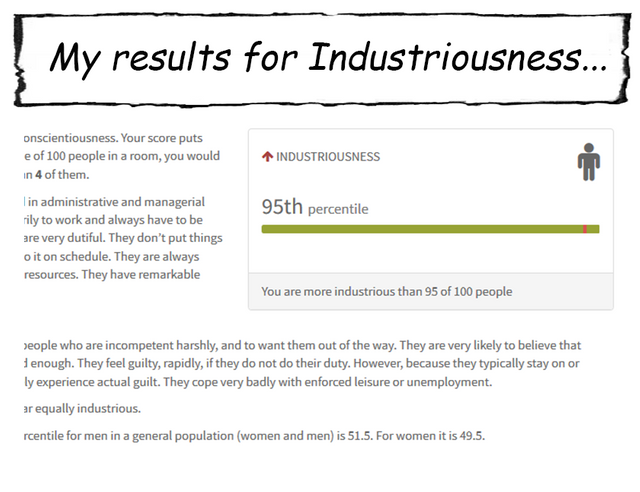
Here’s how I felt about my results…
I was more than happy with them and I did feel the results and descriptions were accurate to who I was. In fact, I was actually surprised how uncannily true some of this information really was.
The report was packed with information, which nearly came to 6,000 words in total and each trait and their aspects were covered in plenty of detail, including a short explanation at the end of each on how men and women will differ and how someone would either be more conservative or liberal in their ideology.
When analyzing your results, you do need to sometimes take into account whether you had a high or low result in one of the other corresponding traits, to get a more accurate picture of who you are. One example of this was in my Orderliness, which was rated as Very High. The report then went on to say this about those with very high Orderliness:
Very orderly people are highly disgust-sensitive, extraordinarily judgemental, and have a strong tendency towards right-wing authoritarianism (particularly if low in openness).
Now, I’m not like this at all. I’m actually high in Openness and not low, which is why I don’t have these characteristics to my personality. I hope by seeing this that you can see that you will need to mix and match slightly depending on the results in your other major traits and their aspects.
I’m glad to say I didn’t receive any results that I felt overly concerned about, although my Politeness could do with some improvement. If you do receive some results that seemed unfairly harsh to you, then the report does point out that you were probably more self-critical than necessary when completing the questions. This leads back to what I had mentioned earlier with the seven conditions you should adhere to when taking the test.
I personally don’t feel compelled in any way to try Jordon Peterson’s Self Authoring program, which I expect, nonetheless, is very good. Anyone who’s received bad results in a particular area and feel they need to improve themselves, will, I’m sure, benefit greatly from it.
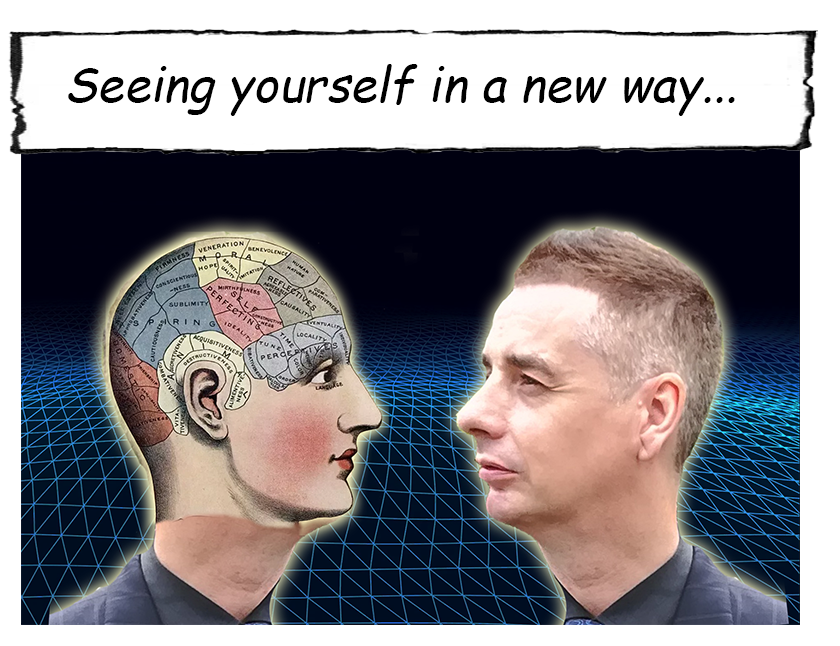
Jordon Peterson does say that the two – Understand Myself and The Self Authoring Suite – when combined together will effectively bring high quality psychological information and advice and help to a very broad audience at a very low cost and with a relatively minimal demand on time. It does seem like a great opportunity for those who want to understand who they are, as well as those around them, and to be able to configure their lives to become more solid responsible citizens. If a person’s goal is to become as emotionally stable as possible and hopefully find happiness along the way, then combining both of these programs could be the answer.
Any time now…
Jordon Peterson is about to also include a couples assessment, which will enable those who have filled out the report to invite someone else to do the questionnaire. This will result in both parties receiving a report which will point out both their similarities and differences. This can then help them in their relationship to understand where they can go to be in agreement and how they can get along and share interests and where they are likely to have conflict and what can be done about it.
There will also be a high school version of The Self Authoring Suite, which will be tailored specifically to young people, so that they can start to plan their lives ahead. This could actually be very important because, as Jordan Peterson points out, you don’t usually get the opportunity to do this in school – whether it’s in junior high, high school, college, or even university. No one sits down with you and helps you to figure out where you came from; who you are and what you’re doing, so this could be an especially powerful addition to The Self Authoring Suite.
Please feel free to post any comments below because I would love to hear from you.
Until next time…

Understand Myself (personality assessment)
https://www.understandmyself.com
The Self Authoring Suite (to configure your behavior for self-improvement)
https://www.selfauthoring.com
Very interesting - have you taken any other personality tests like Myers-Biggs or DISC so you can compare the results?
Thanks for the comment. No I haven't, but I'll look into it because that would be interesting to do.
Nice post! I particularly liked this line:
"our personalities act as a type of filter through which we organize our perceptions"
A cool way to think about personality, and one that I haven't encountered before. It's crazy that the brain is powerful enough to change itself to its own liking over time -- "self-authorship" as Dr. Peterson puts it.
I have also done the test myself. This was a very detailed post. Well done!
I never expected the result I got! I recently did my first Steemit article on equity release. It's a great platform and I'm enjoying the diversity of content.
Interesting article. Thank you.